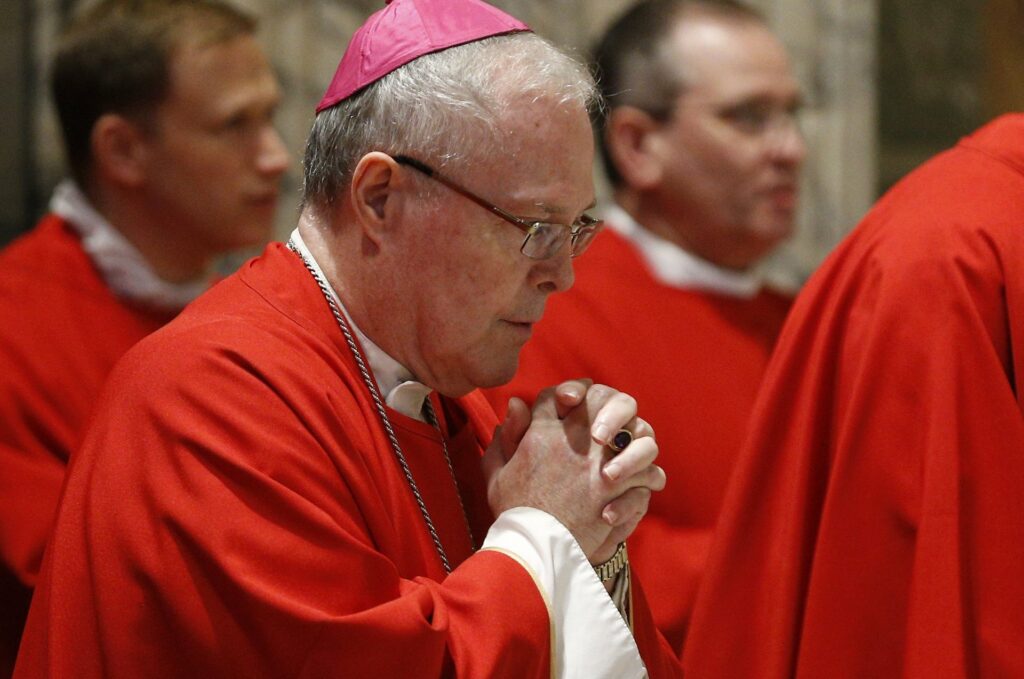PAUL., Minn. — Bishop Michael J. Hoeppner presided over a farewell Mass to the Diocese of Crookston, Minnesota, April 15, two days after Pope Francis accepted the bishop’s resignation from pastoral governance of the northeast Minnesota diocese.
As requested by the pope, Bishop Hoeppner, 71, resigned April 13 following a 20-month investigation into allegations that he mishandled allegations of clergy sexual abuse.
That investigation was the first of a standing U.S. bishop under Pope Francis’ 2019 legislative document “Vos Estis Lux Mundi” (“You are the light of the world”), which provided universal means for holding bishops and other Church leaders accountable for actions in addressing abuse claims, following the abuse scandal of Theodore McCarrick, a former U.S. cardinal.
As metropolitan archbishop of Minnesota, North Dakota and South Dakota, Archbishop Bernard A. Hebda of St. Paul and Minneapolis oversaw the investigation, which was carried out by a team of experts in safe environment and civil and canon law.
Pope Francis has appointed retired Bishop Richard E. Pates of Des Moines, Iowa, as apostolic administrator of the Crookston Diocese until a new bishop is appointed.
Bishop Pates, 78, is a former priest and auxiliary bishop of St. Paul and Minneapolis. He concelebrated the April 15 Mass at Crookston’s Cathedral of the Immaculate Conception with Bishop Hoeppner.
In his homily, Bishop Hoeppner, who had led the diocese since 2007, spoke with positive overtones, thanking the diocese’s Catholics and calling it “a joyful moment because of God’s gift of the Holy Spirit and these past 13 years, so many wonderful things.”
“There’s a sadness in parting, but again we welcome Bishop Pates and thank him so very much,” he said.
He acknowledged his resignation and its general circumstances.
“Pope Francis has asked for my resignation and has accepted it as I’ve given it,” he said. “It comes as a result of the investigation into reports that I at times failed to observe applicable norms when presented with allegations of sexual abuse involving clergy of this diocese. And so that resignation has been accepted, and Bishop Pates comes now.”
He apologized “to you and everyone, as I’ve apologized to the Holy Father, for any failures of mine in governing as bishop,” he said.
“At the same time,” he said, “I hold dear the many good things and blessings that God has showered on us these past years.”
He went on to express gratitude for the people with whom he has worked and to reflect on what he has enjoyed as a bishop, such as teaching and celebrating the sacraments, and the Crookston Diocese’s accomplishments under his leadership, including a 2018 diocesan convocation held jointly with the adjacent Diocese of Fargo, North Dakota, and a 2009 diocesan synod and its resulting pastoral plan. He commended the diocese’s Catholics for their strong faith.
He said that he’ll now “try to get his knees fixed” and has plans to move with his sister to a warmer climate.
He also shared those plans to move south in an April 13 letter to the Catholics of his diocese. The letter had a similar tone and covered many of the same themes of his homily at the farewell Mass. The letter did not mention victim-survivors of clergy sexual abuse.
Bishop Pates also shared an April 13 letter to the diocese’s faithful, in which he said he wished “to express the respect that is owed to Bishop Hoeppner at this time. He cooperated and made his position known with the investigation that was undertaken regarding concerns dealing with the process of clerical sexual abuse and now that a conclusion has been reached, he has cooperated with the determination.”
Bishop Pates also expressed gratitude for Bishop Hoeppner’s years of service to the diocese.
“This moment affords all of us in the diocese to turn our attention once more to the mission that has been entrusted to us to make Jesus Christ known and loved in our time,” he said.
He noted his anticipation for Catholics to return to parish life “as we reopen our churches more and more” as COVID-19 pandemic-related restrictions continue to ease.
Although Church leaders have not noted the specific allegations leading to Bishop Hoeppner’s allegations and investigation, a former permanent diaconate candidate, Ron Vasek, has accused him of trying to cover up an allegation of sexual abuse he made against Msgr. Roger Grundhaus, a priest of the diocese.
In an April 13 story, The Pillar, an online Catholic news outlet, raised questions about what’s next for bishops who resign under “Vos Estis” but who are not tried for a canonical crime, noting “there is very little canonical clarity about what should happen when a bishop like Hoeppner or (Bishop Joseph R.) Binzer loses his office, or even how they should lose it in the first place.”
On May 7, 2020, Pope Francis accepted Bishop Binzer’s resignation as a Cincinnati auxiliary bishop after it was revealed he had failed to inform Archbishop Dennis M. Schnurr and the priest personnel board of a priest’s inappropriate conduct with teenage boys. The priest has since been charged with rape.
In August 2019, Archbishop Schnurr removed Bishop Binzer as director of priest personnel for the archdiocese in August after his failure to report the incidents became known; Bishop Binzer also resigned from the U.S. bishops’ Committee on the Protection of Children and Young People.
Bishop Binzer has recently been appointed pastor of two parishes in the Cincinnati Archdiocese.

